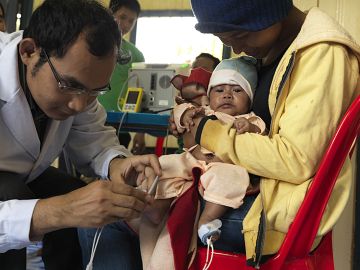Thousands more children will survive by increasing access to pulse oximetry
18 July 2023
A new study, developed and implemented by a research team from Malaria Consortium, found that handheld pulse oximeter devices can be used in routine care settings to save lives among children under five in countries with limited access to health resources.
Low-income countries in sub-Saharan Africa and South Asia have high rates of newborn and under five deaths, mostly caused by preventable conditions including pneumonia, diarrhoea and malnutrition. Timely recognition and referral of severely ill children is especially critical in these settings, but handheld pulse oximeters (or ‘SATs monitors’) – medical devices that clip to the finger to take the blood oxygen level of a patient to detect hypoxaemia, a severity indicator of these most common causes of death in children – are not commonly available.
Cost-effectiveness of pulse-oximeters, which are becoming increasingly affordable, has been proven. However, evidence on their usability in community health settings is scarce. This research explored the usability of pulse-oximeters for community health and primary care workers in Cambodia, Ethiopia, South Sudan, and Uganda – four of the 15 countries with the highest rates of mortality in children under five.
The study found handheld pulse oximetry highly cost-effective when used in combination with the integrated management of childhood illness (IMCI) which could potentially save 148,000 lives in these countries.
Dr James Tibenderana, Malaria Consortium’s Chief Executive, commented: “The scaled use of pulse oximetry is vital, and this important work highlights the need for improved probes and adequate training to support its effective use by frontline health workers where they are most needed. Malaria Consortium will continue to support this work through our country teams working with respective ministries of health and advocating for further, much needed investment from donors.”
Over the past 10 years, Malaria Consortium has been at the forefront of pneumonia case management implementation research supporting child survival, leading randomised controlled trials with thousands of community health workers and researching the use of technology and innovations in social and behaviour change communication.
Improving equitable access to high-quality services is integral to improving child survival and requires a health system strengthening approach, modelled on the World Health Organization’s Health Systems Framework. This entails improving prevention, diagnostic aids and health worker training, and guaranteeing equitable access to treatment at the community, health facility and hospital levels.
Read more about strengthening strategies for child survival in Ethiopia
Related content
8 June 2023
Prioritising the pneumonia and diarrhoea agenda in Ethiopia: Strengthening strategies for child survival
Prioritising the pneumonia and diarrhoea agenda in Ethiopia: Strengthening strategies for child survival
13 June 2023Ethiopia marks another milestone in its pneumonia and diarrhoea reduction plans
27 April 2023Countries commit to move the needle on child survival at 2nd Global Forum on Childhood Pneumonia
Latest news
- Malaria Consortium honoured by Ugandan government for contribution to combat malaria23rd April 2024
- International summit calls for AMR accountability in public health interventions21st March 2024
- Global SMC community celebrates new milestone at SMC Alliance Annual Meeting in Nigeria6th March 2024
- Scaling up key interventions could halve pneumonia-related childhood mortality13th February 2024
- Malaria Consortium and eGov Foundation join Mozambique’s national malaria programme to digitalise seasonal malaria chemoprevention campaigns8th February 2024
- World’s first malaria vaccine rollout launched in Cameroon22nd January 2024